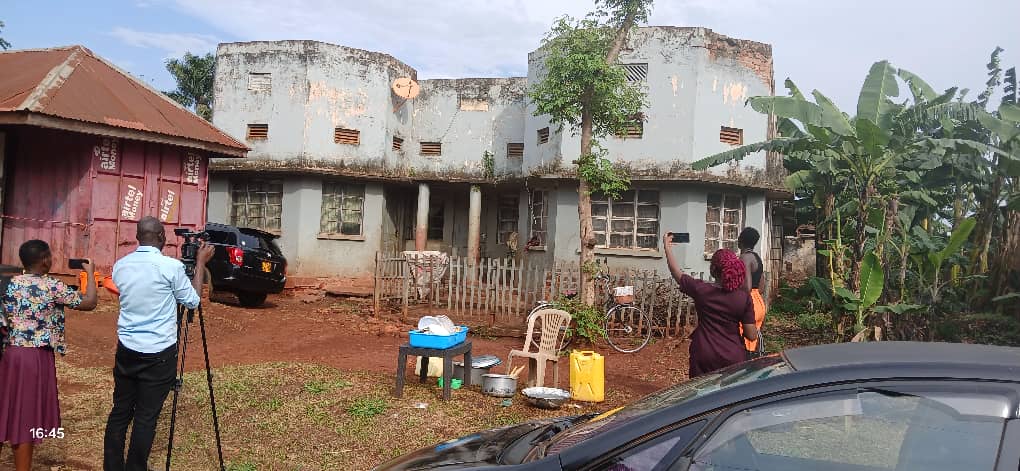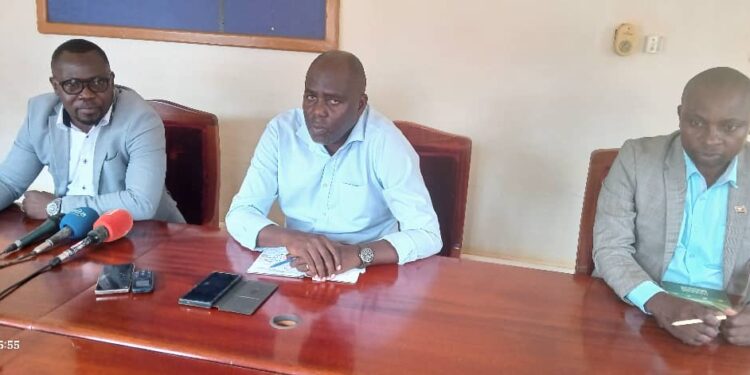A fresh controversy has erupted in Jinja, pitting the Jinja Regional Referral Hospital (JRRH) against the Jinja City Council (JCC) over a dilapidated colonial-era property.
The building, constructed in the 1950s, has been home to some health workers who handle critical areas at the hospital.
The Jinja City Land Board recently advertised the property, situated along plot 47 on School Lane near Jinja Senior Secondary School, for sale, sparking outrage from the hospital management.
Dr. Alfred Yayi, Director of JRRH, has pleaded with the JCC to spare the building, citing the need for staff accommodation and other developments to support health service delivery.
“…I therefore request that this plot be left for purposes of staff accommodation and any other developments by the hospital management to support health service delivery for the public as efforts are being made to formalize the ownership…,” Dr. Yayi begged.
However, Abubaker Kirunda Menya, Secretary of the Jinja City Land Board, remains firm, stating that the property is already out for grabs.
“…the City Land Board advertised the property to potential developers in the New Vision, and a number of people responded to the advert…”, reads part of a letter signed by Menya.

The JRRH management board, led by Chairperson Dr. David Charles Mukisa has warned the JCC against the move, threatening legal action and a mega demonstration by health workers.
Dr. Mukisa questioned the motives of Jinja City Council Town Clerk Edward Lwanga, who sits on the hospital management board.
“…We expected Lwanga’s dual position to provide him with a deep understanding of the intricacies, challenges and opportunities within both the city council and the hospital management board enabling him to make informed decisions and facilitate effective collaboration between the two bodies…”Dr. Mukisa pointed out.
He cited the issue of mortuary services, which the hospital has continuously offered to city residents when the City Council is by law meant to have one of its own.
Jinja City Council is obligated by law to have its own mortuary, but it lacks one. Instead, the Jinja Regional Referral Hospital has been generously allowing the council to use its mortuary services for decades.
The JRRH leaders are now calling on the council to show appreciation for this arrangement and reciprocate by not attempting to seize the hospital’s properties under the guise of technicalities.
Essentially, health officials say the hospital is merely seeking mutual respect and cooperation from the Jinja City council rather than being taken advantage of.
Globally, city authorities are expected to provide essential services, including housing, roads, and basic infrastructure like mortuaries, especially as cities expand.
Having a mortuary is necessary for several reasons:
Public Health: Mortuaries play a critical role in preventing the spread of diseases by providing a safe and sanitary environment for handling and storing deceased individuals.
Dignity and Respect: Mortuaries ensure that the deceased are treated with dignity and respect, which is essential for the emotional well-being of their families and loved ones.
Legal and Administrative Purposes: Mortuaries provide a secure and organized environment for storing and managing deceased individuals, which is necessary for legal and administrative purposes, such as autopsies, investigations, and certification of deaths.
In the context of Jinja City Council, having its own mortuary would enable the city authority to provide better services to its residents, ensure public health and safety, and demonstrate respect for the deceased and their families.
Dr Mukisa implores the Mayor Alton Peter Kasolo-led Council to reconsider their position and urges the Land Board headed by a well-respected Kampala City legal guru Counsel Jamil Mukama Sanyu to give preference to the hospital to continue hosting its staff.
Other members of the Jinja City Land Board who are equally men and women of indisputable caliber include Counsel Alex Luganda who doubles as Busoga kingdom Attorney General, NRM’s Emmanuel Joram Kamugisha (popularly known as Gish), Ms. Barbra Munyaruguru (teacher at JIPRA), businesswoman Harriet Mirembe Mukisa, Philp Bogere of Fantasy Club, and former youth councilor Mohammed Katuntubiro.
Dr Mukisa is optimistic that the matter is going to be handled diplomatically through honest and respectful engagements in a bid to enhance harmony and service delivery.
Peter Kisambira, Chairperson of the Finance and Development Committee, who holds the new Jinja City Land Board in high esteem, is also hopeful that the stakeholders will put service before personal gains.
Embracing the ethos of “Service Above Self”, Kisambira urges Jinja City Land Board to prioritise the greater good by relinquishing control of the disputed property, allowing the Jinja Regional Referral Hospital to utilize it for staff accommodation.
“…as we strive to embody the Spirit of Service Above Self, I am reminded about personal gain or territorial interests, but about putting the needs of others before our own…”, Kisambira noted
Views held by many commentators in the vase of the disputed property, it is clear that allowing JRRH to utilize it for staff accommodation will have a far greater positive impact on the community’s healthcare and well being than any competing interests.
On the argument being fronted by some people that JRRH lacks legal documents to support its claims, Dr Mukisa has dismissed it as insignificant given that the matter involves government entities.
In such cases, he says the Jinja City Land board should assist the hospital in obtaining the necessary documents instead of using this as a reason against it.
“…In essence, the government-to-government nature of the dispute takes precedence over technicalities related to documentation, the focus should be on resolving the issue in a manner that benefits the public interest, rather than exploiting loopholes…”, Dr David Charles Mukisa states.
At the same news conference, David Semakula, the Principal Hospital Administrator (PHA) of Jinja Regional Referral Hospital (JRRH), quoted Prof. Francis Gervase Omaswa, the former Director General of Health Services, sent a clear message to Town Hall.
Prof. Omaswa’s wise words, “health is made at home and treated at health facilities,” were used by the usually camera-shy Semakula to convey a strong message to Jinja City Hall authorities.
David Semakula emphasized that healthcare should be a top priority, especially since anyone can fall ill, regardless of their status.
He urged the authorities to focus on providing quality healthcare services rather than pursuing wealth and personal gain.
This statement underscores the importance of accessible and reliable healthcare facilities, like JRRH, which serves 11 districts in the Busoga sub-region.
The controversy has raised concerns about the management of public properties in Jinja and the need for transparency and accountability in decision-making processes.
This is not the first time JRRH has been embroiled in a land dispute. In 2024, the hospital was involved in a contentious land wrangle with the Uganda Muslim Supreme Council (UMSC) over a piece of land adjacent to the hospital and Muslim cemetery.
The dispute was eventually resolved, with the Uganda Land Commission directing the UMSC to vacate the land.
The Ministries of Health and Lands led by political heads Hon Judith Nabakooba and Hon Dr Jane Ruth Aceng later mediated and donated 0.5 acre to the Muslim fraternity as parking space during funeral ceremonies.
The ongoing property dispute between Jinja Regional Referral Hospital and Jinja City Council has captivated the attention of stakeholders and citizens nationwide.
As the situation continues to unfold, many are watching with keen interest to see how the matter will be resolved.
Despite Uganda’s history of witnessing contentious land disputes, which have sometimes led to the demolition of churches or mosques, the Jinja community remains on edge.
The prevailing sentiment is that “anything is possible” in this context, leaving many to wonder what the outcome will be.
The question on the lips of everyone is: Will the Jinja City Council through the City Land Board prevail in its bid to claim the property, or will the hospital’s pleas to preserve the staff accommodation fall on receptive ears?
Ugandans and Jinja City dwellers wait with bated breath as the drama unfolds.
Do you have a story in your community or an opinion to share with us: Email us at editorial@watchdoguganda.com













